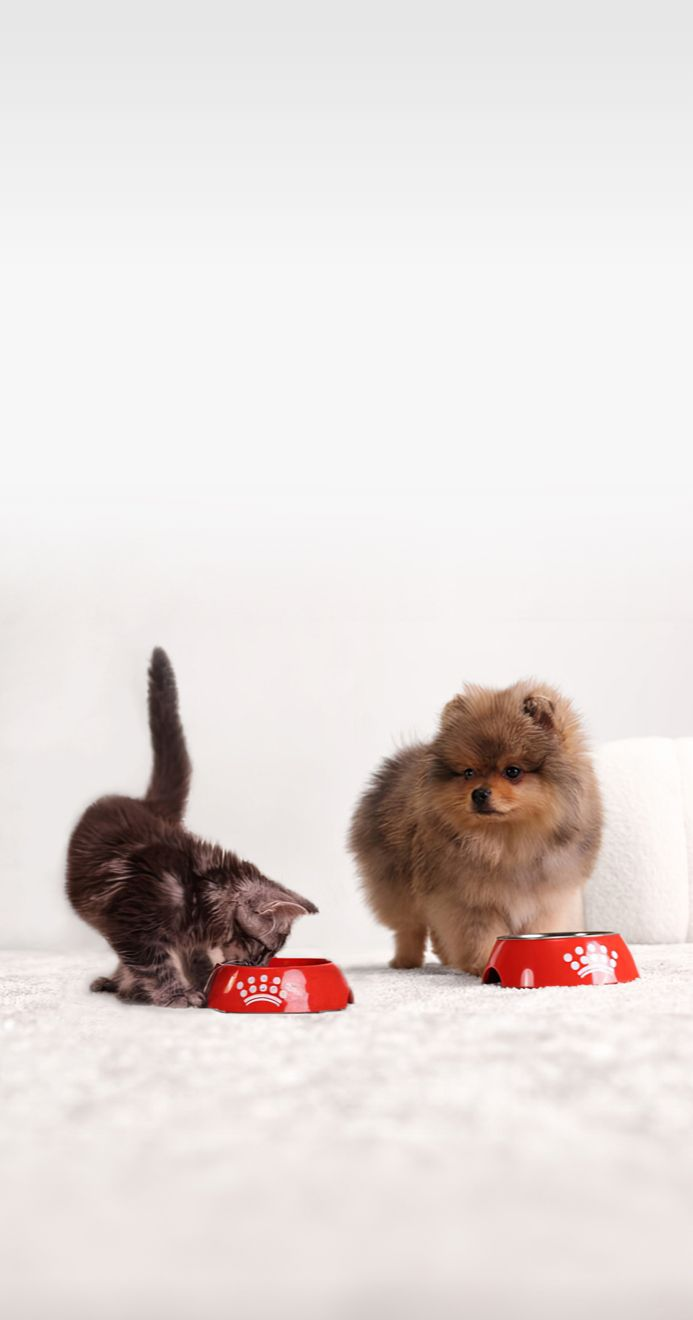Frequently Asked Questions
• Mix 25% of your new diet with 75% of your pet’s previous diet for 2 or 3 days
• Then mix the two diets 50% and 50% for 2 or 3 days
• Then mix 75% of the new diet with 25% of the previous diet for 2 or 3 days
• You can now try feeding with 100% of the new diet.
This guide is also useful for an easy transition of the same product from current bag to new bag.
Based on size, age, lifestyle and breed, each cat and dog has unique nutritional needs. For healthy pets, use our product selector to find the right diet for your cat or dog.
If your pet is experiencing health issues, please refer to your veterinarian for more information. They will consider multiple factors when recommending an appropriate diet.
Feeding guidelines are provided for each Royal Canin diet, based on the age, size and/or weight of the pet. These indicate the amount to feed your pet each day. It’s recommended to divide this into two or three meals throughout the day.
Use an appropriate weighing scale and/or the specific measuring cup as annotated on the bag. Always ensure that you measure food very carefully. A small measuring variation when feeding cats and small dogs can significantly increase their calorie intake.
Pets, particularly cats, may be occasionally sensitive to subtle variations in diets. However, our palatability trials have clearly shown a preference for the diet products.
For a smoother, more gradual transition from one bag to another, remember to buy your new bag a week in advance to enable mixing of the current bag and the new bag together.
The best way to keep the product fresh is to store it in the original bag, inside an airtight container. Since the product is naturally preserved, the longer it is open, the more the product can oxidize. It’s not recommended to freeze the pet food as this draws out the moisture in the kibble and, upon thawing, can cause mold.
To keep wet foods fresh, place them in a covered container in the refrigerator and make sure they are used within 1 - 2 days.
Whether feeding your pet wet or dry food, it’s important to wash their dishes regularly and thoroughly rinse them with clean water, as remaining food can attract bacteria and insects.
Dry diets should be stored in their original bags and resealed between feeding. Most small bags include a resealable zipper. If the bag does not have this feature, it’s recommended to keep the product in the original bag and store in a dry, airtight plastic or steel container with a lid.
Canned, wet diets, once opened, need to be covered and refrigerated in a sealed plastic or ceramic container. If your pet doesn’t like cold food, try warming it to room temperature before feeding. (please note: if you use a microwave put the product in an appropriate microwave-safe container and always check temperature before feeding).
For dry diets, palatability of the kibble remains at its best for one month after the bag is opened, however will be fine for up to two months so long as the bag is stored properly, in a cool, dry, airtight container.
Once opened, wet food should be refrigerated and consumed within two days. If left out at room temperature, it should be discarded after two hours.
We put our suppliers through a rigorous selection process that doesn’t end with our first purchase.
We monitor every load delivered to our plants to verify the safety and quality of the ingredients we use to make pet food.
We perform tests on finished pet foods before they are shipped to our customers.
We manufacture every pet food we sell, in plants that we own; our plants are ISO 9001:2008 certified for Quality Management and ISO 22000 certified for Food Safety.
All our food is made to the strictest quality requirements to ensure absolute safety.
Because cats and dogs deserve the best nutrition to remain in the best of health, Royal Canin is committed to:
• Selecting the suppliers of raw materials in accordance with very strict specifications
• Testing the quality of the ingredients before they are accepted for use in Royal Canin foods
• Only using meat from animals which are declared fit and healthy for human consumption
• Quality control from the moment the raw materials enter the factory tight through to the packaging stage, thanks to systematic measures and analysis at all key stages
• Complete traceability and identification of all ingredients
Ingredients for Royal Canin products are selected based on multiple different factors, including the suppliers’ compliance with our quality and food safety requirements, consistent availability and nutrients available.
Royal Canin is making strides towards sustainability by attempting to obtain raw ingredients as close to each manufacturing facility as possible.
Get in touch
Our history
For a sustainable future

Find the right product
Answer questions about your pet
Get customised recommendation
Unlock your pet’s health follow up